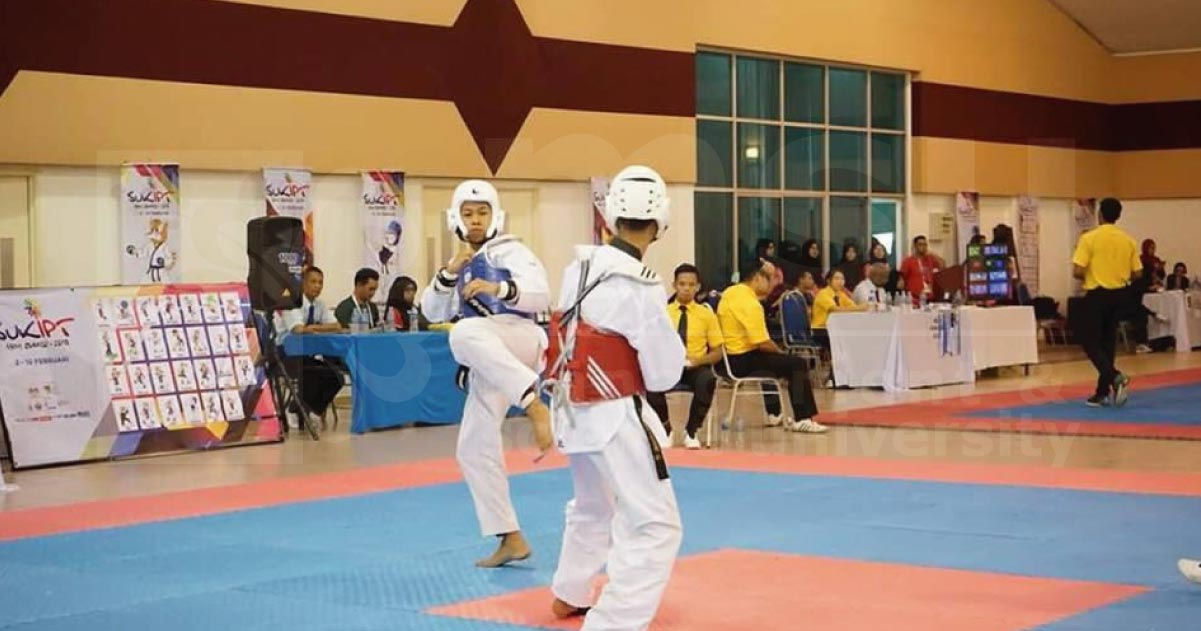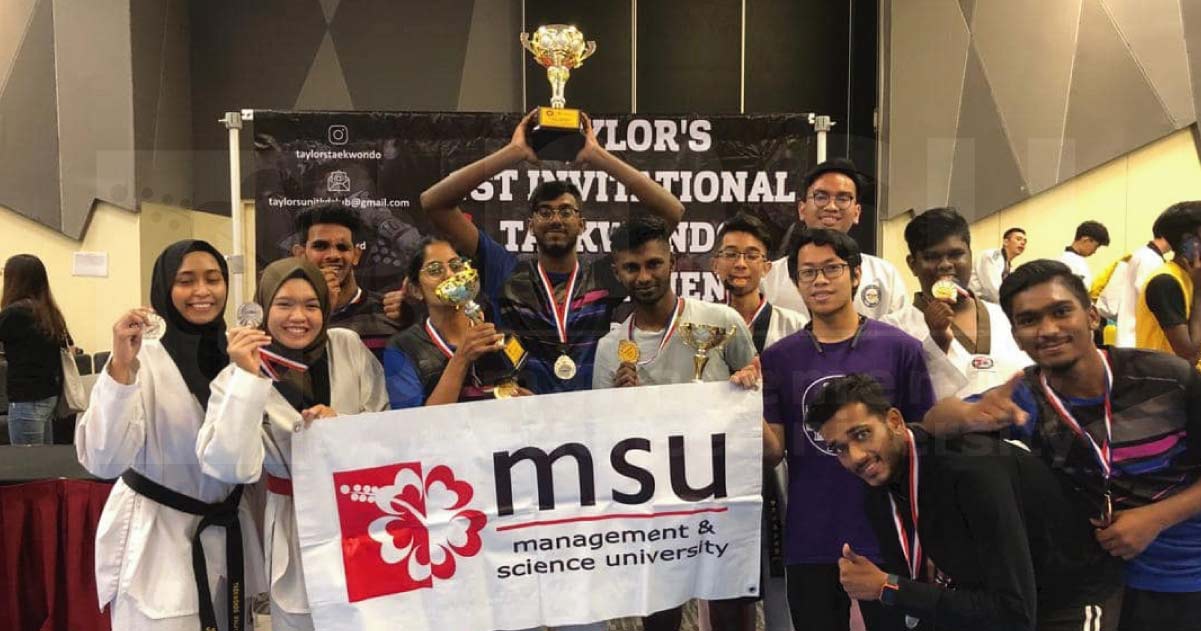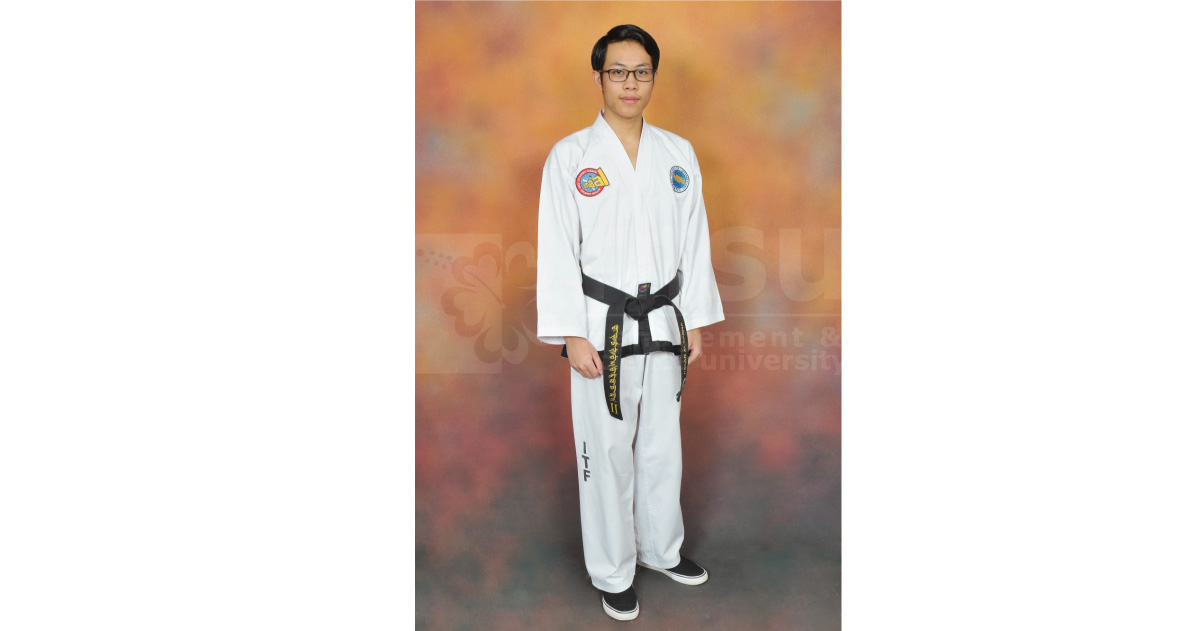

The impression on Hasan Al-Banna Mohd Husni during his early years as a member of the human race was one of him being smart yet frail. As a kid, he was often sick. His allergy condition landed him in more than three ENT surgeries. It was said that anything physical could be an exertion to his relatively small stature, and that he would be better off pursuing academic achievements instead.
Yet it has also been said that true power is like an iceberg – most of it is underneath the surface. The perceived frailty pushed Hasan to do more than others of similar physique to get as fit. He wanted to prove that he could do more and overcome his difficulties. Attracted to martial art’s demand on focus and commitment, he found a career passion along the way. The 20-year-old born in London at the turn of the millennium observed that the principles of courtesy, integrity, self-control, perseverance, and an indomitable spirit in taekwondo go hand-in-hand with the non-violent conflict resolution pursuits of counselling and guidance. Unlike instrumental action, in which every possible physical thing is done to attain given ends, communicative action is all about understanding and coming to agreeable terms.
He who shares his name with Egyptian leader Hasan Al-Banna traces the martial-art awakening to his beginning year of secondary school in Jordan. Alone and away from home, Hasan had to quickly learn to be independent. Homesickness was a huge challenge. He may be a fluent speaker of Arabic now, but at the time the opposite caused him to fail most of his school subjects and feel the hopelessness of it all. It was taekwondo that returned him on track and restored his confidence.

The practical value of taekwondo may be found in balancing its elemental movements (self-defence, form, and sparring) with their governing principles. When someone attacks you, for example, you can be confident of hurting the attacker, yet with your judgement you may also apply sufficient force to gain control. Taekwondo’s technical ideal of being close to nature, good breathing, and fresh air brings the benefits of good health and bare-handed self-defence. Its artistic ideal, concerning the union of mind and soul reflecting in action, is about being one with nature; beautiful yet powerful movements may result from concentration when one is switched off from the discriminating mind that dictates behaviour. A good way of life is its philosophical ideal; promoting the conversion of a mind controlled, into one in control, building self-confidence and determination into a strong will to choose the positive over the negative.
Back in Malaysia for good having graduated Sixth Form on the Jordanian education system four years on, Hasan Al-Banna enrolled for Bachelor of Counselling and Guidance (Hons) at Management and Science University (MSU) – a remarkable achievement at age 16. He received his first-degree black belt the same year and represented MSU at MASISWA (Majlis Sukan IPTS Malaysia). He received his second-degree black belt two years after, and represented MSU at SUKIPT (Sukan Institusi Pendidikan Tinggi), the Putrajaya Taekwondo Challenge, and the International Taekwondo Federation (ITF) Asian Taekwondo Championship; collectively clinching three silver medals and a bronze in 2018. He won his first gold at the Putrajaya Taekwondo Challenge 2019, and took home a bronze at the Taylors Open Taekwondo Championship 2020. To date, Hasan has thrice received the School of Education and Social Sciences (SESS) Dean’s Award.

Besides his high-achiever family’s encouragement and support, Hasan is thankful for all the opportunities he has been privy to through MSU’s Taekwondo Club. He leads training sessions, is occasionally the assistant instructor and/or tournament coach/umpire, and sits on various club committees. Being active in sports at MSU has presented him with various opportunities and platforms to enhance his leadership and management skills. Whilst a PhD in psychology is a future aim, along with mastery of various other martial arts which have since included silat, kendo, kenjutsu, and kobudo, his admiration for the compassion of the Prophet Muhammad (PBUH), the valiance of Umar Al-Khattab, and the leadership of Sultan Muhammad al-Fateh is placing another dream for da’wah leadership in his line of sight.
The aspiring psychology expert aiming for a future co-curricular career as a highly regarded taekwondo trainer reflects on managing his various NGO associations – including Belia Harmoni, MyCare, Aqsa Sharif, IKRAM, and IKRAM Teens.
“I arrange my time so I can contribute to others while improving myself. My main balancing method is like packing a bag; the tidier you pack, the more useable space you’ll have in your bag. In this regard, you are actually limitless. Push yourself to the end and you will find a new horizon to reach.”

MSU Bachelor in Psychology (Hons)
MSU Bachelor in Marketing with Psychology (Hons)
MSU Bachelor in Education (Health and Physical Education) (Hons)
The impression on Hasan Al-Banna Mohd Husni during his early years as a member of the human race was one of him being smart yet frail. As a kid, he was often sick. His allergy condition landed him in more than three ENT surgeries. It was said that anything physical could be an exertion to his relatively small stature, and that he would be better off pursuing academic achievements instead.
Yet it has also been said that true power is like an iceberg – most of it is underneath the surface. The perceived frailty pushed Hasan to do more than others of similar physique to get as fit. He wanted to prove that he could do more and overcome his difficulties. Attracted to martial art’s demand on focus and commitment, he found a career passion along the way. The 20-year-old born in London at the turn of the millennium observed that the principles of courtesy, integrity, self-control, perseverance, and an indomitable spirit in taekwondo go hand-in-hand with the non-violent conflict resolution pursuits of counselling and guidance. Unlike instrumental action, in which every possible physical thing is done to attain given ends, communicative action is all about understanding and coming to agreeable terms.
He who shares his name with Egyptian leader Hasan Al-Banna traces the martial-art awakening to his beginning year of secondary school in Jordan. Alone and away from home, Hasan had to quickly learn to be independent. Homesickness was a huge challenge. He may be a fluent speaker of Arabic now, but at the time the opposite caused him to fail most of his school subjects and feel the hopelessness of it all. It was taekwondo that returned him on track and restored his confidence.

The practical value of taekwondo may be found in balancing its elemental movements (self-defence, form, and sparring) with their governing principles. When someone attacks you, for example, you can be confident of hurting the attacker, yet with your judgement you may also apply sufficient force to gain control. Taekwondo’s technical ideal of being close to nature, good breathing, and fresh air brings the benefits of good health and bare-handed self-defence. Its artistic ideal, concerning the union of mind and soul reflecting in action, is about being one with nature; beautiful yet powerful movements may result from concentration when one is switched off from the discriminating mind that dictates behaviour. A good way of life is its philosophical ideal; promoting the conversion of a mind controlled, into one in control, building self-confidence and determination into a strong will to choose the positive over the negative.
Back in Malaysia for good having graduated Sixth Form on the Jordanian education system four years on, Hasan Al-Banna enrolled for Bachelor of Counselling and Guidance (Hons) at Management and Science University (MSU) – a remarkable achievement at age 16. He received his first-degree black belt the same year and represented MSU at MASISWA (Majlis Sukan IPTS Malaysia). He received his second-degree black belt two years after, and represented MSU at SUKIPT (Sukan Institusi Pendidikan Tinggi), the Putrajaya Taekwondo Challenge, and the International Taekwondo Federation (ITF) Asian Taekwondo Championship; collectively clinching three silver medals and a bronze in 2018. He won his first gold at the Putrajaya Taekwondo Challenge 2019, and took home a bronze at the Taylors Open Taekwondo Championship 2020. To date, Hasan has thrice received the School of Education and Social Sciences (SESS) Dean’s Award.

Besides his high-achiever family’s encouragement and support, Hasan is thankful for all the opportunities he has been privy to through MSU’s Taekwondo Club. He leads training sessions, is occasionally the assistant instructor and/or tournament coach/umpire, and sits on various club committees. Being active in sports at MSU has presented him with various opportunities and platforms to enhance his leadership and management skills. Whilst a PhD in psychology is a future aim, along with mastery of various other martial arts which have since included silat, kendo, kenjutsu, and kobudo, his admiration for the compassion of the Prophet Muhammad (PBUH), the valiance of Umar Al-Khattab, and the leadership of Sultan Muhammad al-Fateh is placing another dream for da’wah leadership in his line of sight.
The aspiring psychology expert aiming for a future co-curricular career as a highly regarded taekwondo trainer reflects on managing his various NGO associations – including Belia Harmoni, MyCare, Aqsa Sharif, IKRAM, and IKRAM Teens.
“I arrange my time so I can contribute to others while improving myself. My main balancing method is like packing a bag; the tidier you pack, the more useable space you’ll have in your bag. In this regard, you are actually limitless. Push yourself to the end and you will find a new horizon to reach.”

MSU Bachelor in Psychology (Hons)
MSU Bachelor in Marketing with Psychology (Hons)
MSU Bachelor in Education (Health and Physical Education) (Hons)